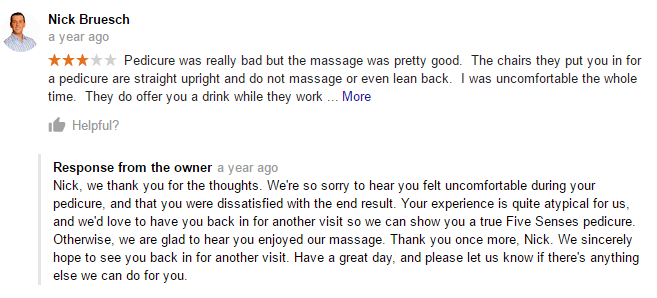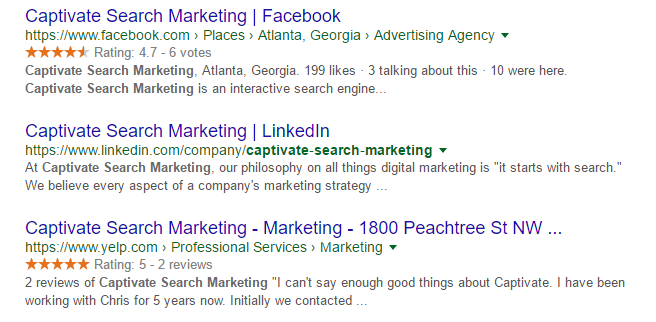From landlords investigating potential tenants to businesses evaluating prospective vendors, Google’s search is the go-to source to scope-out one’s reputation. As such, the Google search engine results can define an entity’s (or an individual’s) online reputation, shaping the perception for those who care.
This has made SEO-driven online reputation management a huge component of search marketing. Both businesses and professionals need to take ownership of the search results that reflect their name, in addition to the products and services they provide.
And this effort extends into our personal lives as well. Think about trying to land the ultimate apartment rental or dream job. If a landlord or employer searches your name and nothing but negative content ranks on page one, then chances are you’ll have a difficult time competing with other applicants.
Effective SEO can help help control specific types of search results, helping to optimize the online sentiment surrounding a brand or individual. Below we share search first online reputation management strategies that are driven by SEO and other avenues of Internet marketing.
Develop a Review Generation Strategy
One of the most common plagues to a company’s online reputation is bad reviews. Just one bad review can cripple a brand’s image on the web.
Be proactive by motivating and incentivizing customers to leave positive reviews on your company’s Google My Business listing, Yelp page, and other reviewable web properties. Depending on the business you’re in, you can try crafting a unique business card, recipe, or post-purchase hand-out to stimulate happy customers to take action. Offering a “proof of review” incentive for a certain percent discount on a future purchase is crafty and effective strategy.
Not only does generating a high volume of good reviews help build a positive online reputation, but it can mitigate the possibility of a future bad review (by not ruining your aggregate 5 star review rating.) Be creative and develop a review generation strategy that’s aligned with your customers best interests.
Create an Unhappy Customer Contingency Plan

When negative reviews do arise, your business should have a system in place to handle such cases. Being responsive is key. Although specific to Yelp, this article has some creative (and humorous) ways to go about responding to negative reviews on almost any platform. Below is a compelling video found on that article.
There are countless ways to go about creating a contingency plan for unhappy customers who leave negative reviews. Ultimately, the foundation centers on automating a process that responds to the reviewer and helps turn the sentiment around.
For more good insights on this topic, I encourage you to read these articles on Entrepreneur.com and Forbes.com.
Proliferate Your Social Media Presence
In addition to your company’s Google My Business listing and Yelp page (which are socially-oriented in nature,) proliferate your brand’s presence on various other social media platforms like LinkedIn, Twitter, Facebook, Instagram, SnapChat, Pinterest, etc.

These social media profiles are valuable SEO assets that can help you own page one of Google for branded keywords. This is because these types of sites offer high domain authority. So having a profile that’s optimized around your brand name on these social sites can help you better control the search results. This is particularly effective for individual professionals and consultants who are concerned with search results surrounding their name.
Properly Optimize Your Web Properties
Applying basic SEO principles on all optimizable web properties can further help you dominate page one of Google for brand keywords. With your website being number one, be sure to mention your brand name in the Page Title and Meta description of the homepage.
Similarly, you can acquire customizable or vanity URLs on your brand’s LinkedIn, Facebook, Pinterest, and Google+ (or Google My Business). Here can include brand keywords to help ensure these web properties rank better.

Further, instead of writing profile bios and descriptions in the first person (i.e. Our company has been in business for…), keep them in the third person (i.e. Captivate Search Marketing has been in business for… ) to better establish keyword relevancy.
Employ a Content Strategy
Last but most certainly not least, employing content strategy can be a significant player in proactively protecting a brand’s online reputation. Articles, press releases, and blog posts (including guest blog posts) can be rankable assets that can appear on page one for target keywords.
A classic approach is to occasionally produce news content on your blog surrounding any new acquisitions, awards, or accomplishments about your company. For very noteworthy news, invest in a premium press release on PRWeb.com, PRNewswire.com, or related platform. You can optimize these releases for branded keywords as well as product/service-related keywords.
In conclusion, content is most certainly king in the context of online reputation management. The challenge is producing rank-worthy content that help proliferate your brand’s online footprint and appears on page one of Google.
















